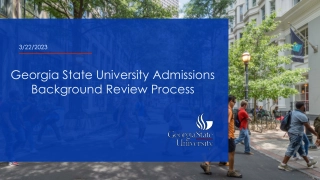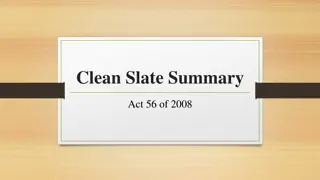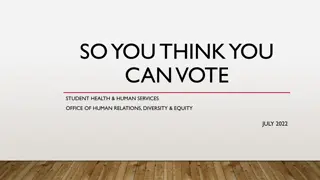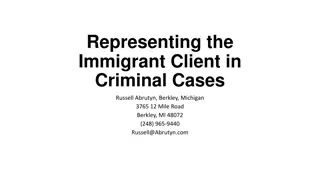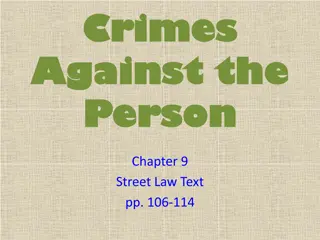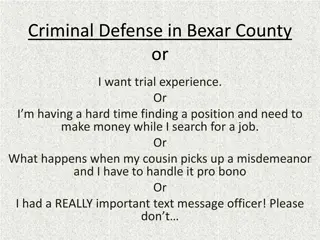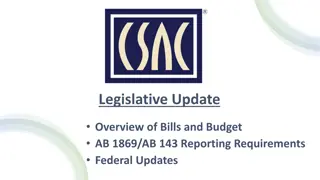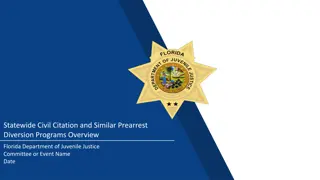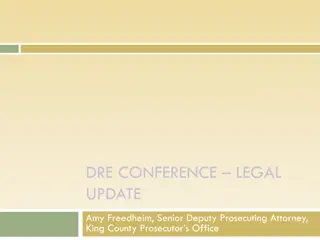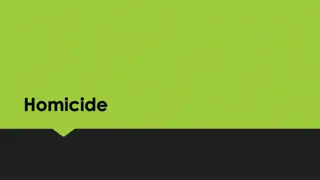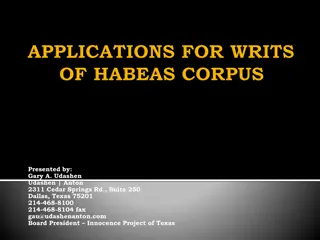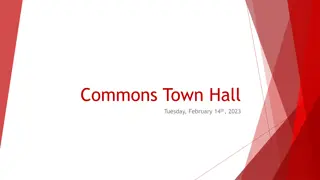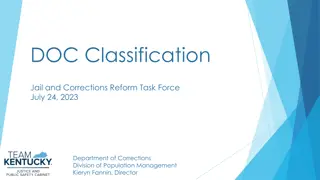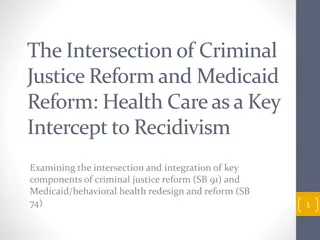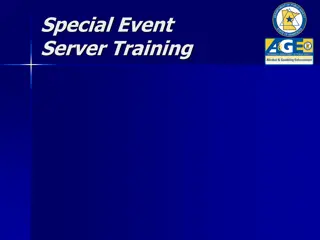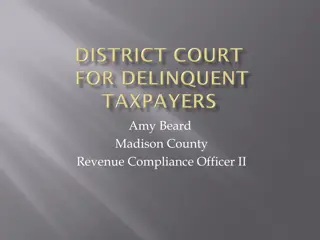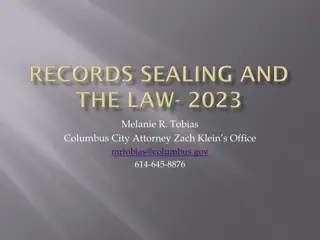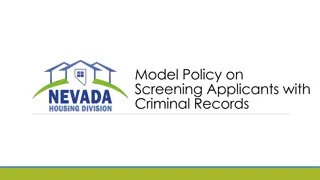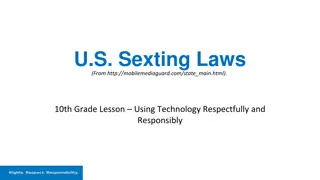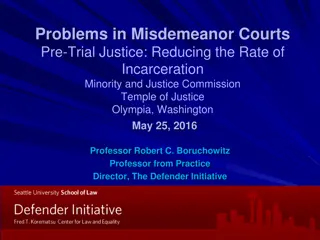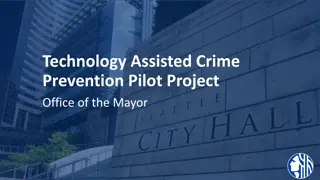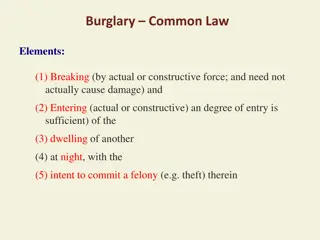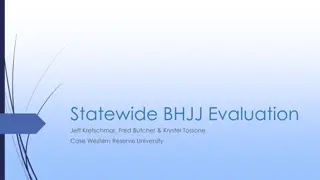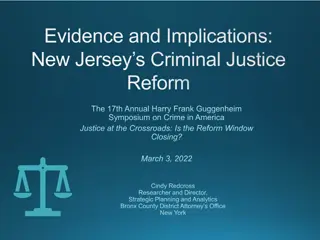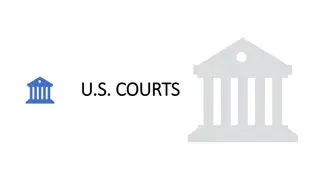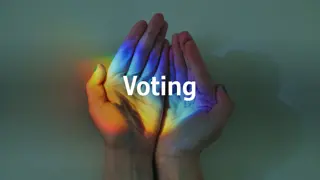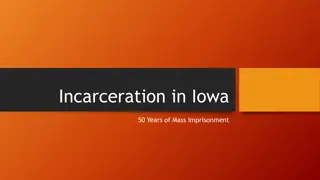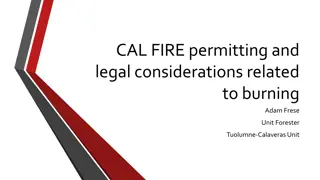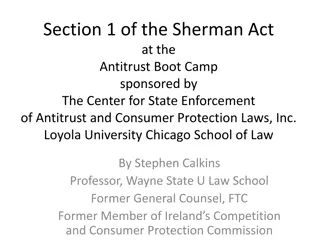Georgia State University Admissions Background Review Process
Georgia State University conducts a comprehensive Admissions Background Review (ABR) process to assess applicants' admissibility based on reported information and potential threats to the campus. The ABR Committee evaluates responses to specific admissions background questions, referring cases invol
1 views • 11 slides
Uniform Statewide Deadly Force Policy in Indiana Law Enforcement Training
The Indiana Law Enforcement Training Board has established a consistent and uniform statewide deadly force policy to ensure public safety and promote equity. This policy prohibits modification by any law enforcement agency and emphasizes the sanctity of human life. Officers are required to follow es
0 views • 53 slides
Kentucky Court of Justice: Truancy and CDW Program Overview
The Kentucky Court of Justice oversees the Truancy and Court Designated Worker (CDW) Program for juveniles. The CDWs handle complaints filed on juveniles until age 18, using formal or informal processes for misdemeanor or status offenses. The program aims to address truancy issues and provide suppor
0 views • 19 slides
Overview of Sealing Misdemeanor Convictions under Acts 56 of 2008
Under Acts 56 of 2008, certain misdemeanor convictions can be sealed following specific criteria and timeframes. The process involves Petition-Based Sealing and Automated Sealing, each with its rules and exclusions. While some convictions qualify for sealing after meeting conditions, others are excl
0 views • 8 slides
Understanding Voting Eligibility and Restrictions in California
Explore the criteria for voter eligibility and the restrictions on voting in California. Learn about who can vote, who cannot vote, and the implications of these restrictions. Consider the impact of allowing more groups to vote and how it could influence elections and government policies. Discuss th
0 views • 14 slides
Common Grounds for Deportation in Criminal Cases Explained
Providing legal representation to immigrant clients in criminal cases involves understanding common deportation grounds such as felony vs. misdemeanor distinctions, crimes involving moral turpitude, aggravated felonies, and drug offenses. These grounds can impact an individual's immigration status,
2 views • 24 slides
Understanding Crimes Against the Person: A Comprehensive Overview
Crimes against the person, including homicide, kidnapping, assault, battery, and sexual assault, are among the most serious offenses. These crimes are categorized by their levels of seriousness and intent, such as criminal and non-criminal homicide. Murder, differentiated into first and second-degre
2 views • 19 slides
Navigating Bexar County Misdemeanor Courts: Tips and Insights
Explore insights on handling misdemeanor cases in Bexar County, from courtroom locations to key personnel roles. Discover tips for legal professionals on managing cases pro bono, gaining trial experience, and navigating the legal system effectively. Also, find resources for office setup and professi
0 views • 45 slides
Comprehensive Update on Legislative Bills, Budget Allocation, and Reporting Requirements
The legislative update covers key bills and budget allocations pertaining to various critical issues such as juvenile justice realignment, felony incompetent-to-stand-trial solutions, and community assistance programs. It also discusses reporting requirements for eliminated criminal administrative f
0 views • 6 slides
Effective Implementation of Civil Citation and Prearrest Diversion Programs in Florida
Civil Citation and Similar Prearrest Diversion Programs in Florida provide an alternative to judicial handling for misdemeanor offenses by focusing on preventing further delinquency. Legislative requirements authorize judicial circuits to establish these programs, specifying eligibility criteria, im
0 views • 17 slides
Hailey's Law Update: Mandatory Impound for DUI Arrests
Mandatory Impound under Hailey's Law requires a twelve-hour hold on vehicles used by individuals arrested for DUI or physical control. Non-commercial or non-farm transport vehicles must be towed, and vehicles with arrested drivers as the registered owner cannot be redeemed for 12 hours. Commercial o
1 views • 18 slides
Understanding Homicide: Types and Examples
Homicide is the killing of one human being by another, which can be criminal, noncriminal, or negligent. It may involve deliberate intent, malice, premeditation, and different degrees of murder like first and second degree. Examples include cases of first degree murder, second degree murder, and fel
0 views • 27 slides
Legal Process for Seeking Relief from Final Felony Conviction
The legal process for seeking relief from a final felony conviction involves steps such as the state answering within 15 days, the district court deciding on unresolved facts, resolving issues through affidavits and hearings, and transmitting findings to the Court of Criminal Appeals. The Court of C
1 views • 81 slides
Analysis of Bail Reform Effects on Recidivism and Felony Arrests
This content discusses the impact of bail reform on recidivism rates and felony arrests, comparing outcomes between posted bail and $0 bail scenarios. Through the analysis of images depicting recidivism trends and felony arrests post-bail release, insights into the effectiveness of different bail sy
0 views • 5 slides
Jail and Corrections Reform Task Force Overview
This document provides insight into the DOC Classification system and the reforms implemented by the Jail and Corrections Reform Task Force. It discusses the objective-based classification systems, risk/needs assessments, and scored risk factors used to make custody decisions. The manual is continuo
0 views • 16 slides
The Intersection of Criminal Justice Reform and Medicaid Reform: Health Care as a Key Intercept to Recidivism
This study examines the integration of criminal justice reform (SB 91) and Medicaid/behavioral health redesign and reform (SB 74) in Alaska. It highlights the history of SB 91, the problems faced by the state's prison system, findings from data analysis, and the impact of SB 91 in reducing the inmat
1 views • 45 slides
Importance of Special Event Server Training for Alcohol Safety
Special Event Server Training focuses on eliminating over-serving of adult alcohol consumers, preventing underage access to alcohol, and ensuring the safety and integrity of event attendees. It aims to reduce the risks of injury, death, criminal charges, and civil litigation while promoting a safe e
0 views • 30 slides
Washington State College Bound Scholarship Program Details
The Washington State College Bound Scholarship Program offers financial aid opportunities to eligible 7th and 8th grade students, covering tuition, fees, and book allowances. Students must meet specific requirements, such as income thresholds or being in foster care, to qualify. It is a two-step pro
0 views • 19 slides
Legal Process for Seeking Relief from Final Felony Conviction
Legal process for seeking relief from a final felony conviction involves the filing of an application, the state's response, and a district court determining unresolved facts regarding the legality of the applicant's confinement. Affidavits, depositions, and hearings may be conducted to resolve thes
0 views • 67 slides
Madison County Revenue Compliance Procedures
The procedures followed by Amy Beard, a Revenue Compliance Officer II in Madison County, towards delinquent taxpayers include contacting, sending certified letters, filing warrants, and conducting hearings and trials. Repeat attempts are made to contact taxpayers and ensure compliance. Failure to co
0 views • 11 slides
Understanding Records Sealing and Expungement in Ohio
Records sealing and expungement in Ohio are processes that allow individuals to have their criminal records either sealed from public view or completely destroyed. These acts are privileges, not rights, and applicants must meet specific criteria to be eligible. Expungement involves the physical dest
0 views • 21 slides
Model Policy on Screening Applicants with Criminal Records
This model policy outlines the screening process for applicants with criminal records, including conducting background checks, considerations for felony offenses, and violent felony offenses. It details the steps management companies should take when assessing applicants with criminal backgrounds, i
0 views • 11 slides
Understanding U.S. Sexting Laws for 10th Grade Lesson
Avoid the serious legal consequences of sexting by learning about U.S. laws. Possessing, distributing, or promoting explicit images of minors is a felony. Teens can face charges as adults and may have to register as sex offenders. Tips include not sexting, deleting unsolicited images, and seeking he
0 views • 6 slides
Challenges in Pre-Trial Misdemeanor Courts: Addressing Minority Incarceration Rates
Amidst clear legal guidelines, some misdemeanor courts in Washington continue to witness individuals appearing without legal representation, leading to unjust incarcerations and life-altering convictions. The disproportionate impact on minorities, the heavy burden on resources, and the erosion of ju
0 views • 40 slides
Seattle Crime Prevention Technology Pilot Project
A pilot project in Seattle aims to prevent gun violence, human trafficking, and persistent felony crimes by utilizing new technologies like closed-circuit television (CCTV) systems. These technologies provide additional tools to address criminal behavior in specific locations, enhancing existing cri
0 views • 11 slides
Understanding Burglary and Arson Laws: Common Law vs. Modern Rules
Burglary and arson laws have evolved from common law principles to modern statutes. In common law, burglary involves breaking and entering a dwelling at night with intent to commit a felony, while arson requires malicious burning of another's dwelling. Modern laws may vary, eliminating some elements
0 views • 6 slides
Statewide BHJJ Evaluation Demographics and Trends Analysis
This report presents an evaluation of the Statewide BHJJ Program conducted by Jeff Kretschmar, Fred Butcher, and Krystel Tossone from Case Western Reserve University. It includes insights into youth demographics, enrollment numbers by county, felony trends, youth and family history, OYAS assessment
0 views • 30 slides
Impact of Criminal Justice Reform in New Jersey
Evaluation of New Jersey's Criminal Justice Reform (CJR) reveals a significant shift towards a risk-based pretrial system, with a reduction in misdemeanor arrests and changes in case processing post-reform. The reform led to fewer warrant-issued cases, a decline in misdemeanor offenses, and altered
0 views • 12 slides
Understanding the U.S. Court System: Jurisprudence and Structure
Law enforcement officers play a crucial role in the criminal justice system by understanding criminal jurisprudence and the court system's structure. This includes knowledge of different court levels, jurisdiction, and the adjudication process. The duality of courts, such as adult vs. juvenile court
0 views • 43 slides
Empowering Democracy: Importance of Voting and Civic Engagement
Encouraging voter participation in Tennessee, this content emphasizes the significance of every vote and provides resources for voter registration, absentee voting, and civic engagement. It highlights the impact of felony convictions on voting rights and suggests actions to promote awareness and con
0 views • 7 slides
Racial Disparities in Iowa's Criminal Justice System: A Deep Dive
Examine the stark racial disparities in Iowa's criminal justice system, spanning from incarceration rates to felony and misdemeanor convictions. Despite slightly lower per capita incarceration rates compared to the national average, Iowa faces significant challenges in addressing the overrepresentat
0 views • 10 slides
Regulations and Permitting for Controlled Burning in California
Understanding the legal considerations and permitting requirements related to controlled burning in California, including the necessary permits, restrictions based on fire conditions, and consequences for unauthorized burning. The Public Resources Codes outline specific rules such as obtaining permi
0 views • 12 slides
Understanding Section 1 of the Sherman Act and Antitrust Laws
Section 1 of the Sherman Act prohibits contracts, combinations, or conspiracies that restrain trade or commerce among states or with foreign nations. Violations can result in felony charges, fines, and imprisonment. The section covers various antitrust practices such as price fixing, market division
0 views • 33 slides
